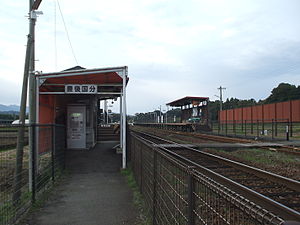Bungo-Kokubu Station
Bungo-Kokubu Station 豊後国分駅 | |
|---|---|
 Bungo-Kokubu Station in 2008 | |
| Location | Japan |
| Coordinates | 33°11′43″N 131°33′05″E / 33.19528°N 131.55139°ECoordinates: 33°11′43″N 131°33′05″E / 33.19528°N 131.55139°E |
| Operated by | |
| Line(s) | ■ Kyūdai Main Line |
| Distance | 131.7 km from Kurume |
| Platforms | 2 side platforms |
| Tracks | 2 + 1 siding |
| Construction | |
| Structure type | At grade |
| Bicycle facilities | Designated parking area for bicycles |
| Disabled access | No - steps to platform |
| Other information | |
| Status | Unstaffed |
| Website | Official website |
| History | |
| Opened | 11 March 1989 |
| Passengers | |
| FY2016 | 333 daily |
| Rank | 295th (among JR Kyushu stations) |
| Location | |
 Bungo-Kokubu Station Location within Japan | |
Bungo-Kokubu Station (豊後国分駅, Bungo-Kokubu-eki) is a railway station in Ōita City, Ōita Prefecture, Japan. It is operated by JR Kyushu and is on the Kyudai Main Line.[1][2]
Lines[]
The station is served by the Kyūdai Main Line and is located 131.7 km from the starting point of the line at Kurume.[3]
Layout[]
The station, which is unstaffed, consists of two side platforms serving two tracks with a siding. There is no station building but each platform has a shelter for passengers. One shelter also houses an automatic ticket vending machine. Access to the opposite side platform is by means of a level crossing.[2][3]
Adjacent stations[]
| « | Service | » | ||
|---|---|---|---|---|
| Kyūdai Main Line | ||||
| Mukainoharu | Local | Kaku | ||
History[]
JR Kyushu opened the station on 11 March 1989 as an additional station on the existing track of the Kyudai Main Line.[4]
Passenger statistics[]
In fiscal 2016, the station was used by an average of 333 passengers daily (boarding passengers only), and it ranked 295th among the busiest stations of JR Kyushu.[5]
See also[]
References[]
- ^ "JR Kyushu Route Map" (PDF). JR Kyushu. Retrieved 23 February 2018.
- ^ Jump up to: a b "豊後国分" [Bungo-Kokubu]. hacchi-no-he.net. Retrieved 14 April 2018.
- ^ Jump up to: a b Kawashima, Ryōzō (2013). 図説: 日本の鉄道 四国・九州ライン 全線・全駅・全配線・第4巻 福岡エリア [Japan Railways Illustrated. Shikoku and Kyushu. All lines, all stations, all track layouts. Volume 4 Fukuoka Area] (in Japanese). Kodansha. pp. 41, 75. ISBN 9784062951630.
- ^ Ishino, Tetsu; et al., eds. (1998). 停車場変遷大事典 国鉄・JR編 [Station Transition Directory - JNR/JR] (in Japanese). II. Tokyo: JTB Corporation. p. 742. ISBN 4533029809.
- ^ "駅別乗車人員上位300駅(平成28年度)" [Passengers embarking by station - Top 300 stations (Fiscal 2016)] (PDF). JR Kyushu. 31 July 2017. Archived from the original (PDF) on 1 August 2017. Retrieved 3 March 2018.
| Wikimedia Commons has media related to Bungo-Kokubu Station. |
External links[]
- Bungo-Kokubu (JR Kyushu)(in Japanese)
- Stations of Kyushu Railway Company
- Railway stations in Ōita Prefecture
- Railway stations in Japan opened in 1989
- Ōita Prefecture railway station stubs
